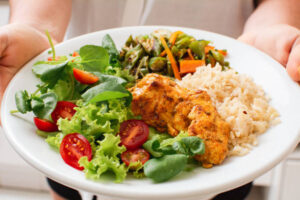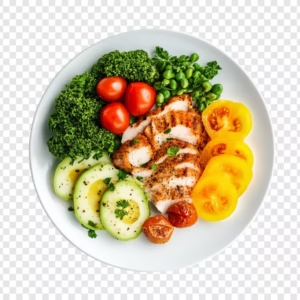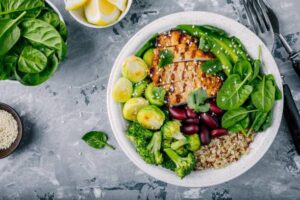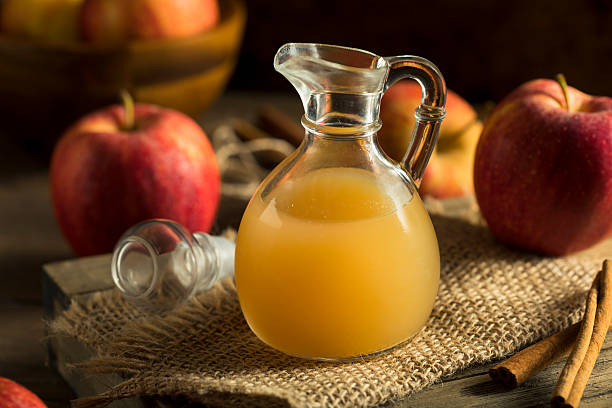After an intense workout, your body craves nutrients to repair muscles, replenish energy, and optimize recovery. A post-workout meal is not just about satisfying hunger; it’s about providing the right combination of nutrients at the right time to help your body recover and rebuild stronger. In this guide, we’ll explore the essentials of crafting a nutritious post-workout meal and how it supports your fitness goals.
Why Post-Workout Nutrition Matters
During exercise, your body uses glycogen (stored carbohydrates) for energy, while your muscles undergo stress, leading to micro-tears in muscle fibers. A post-workout meal serves several critical functions:
- Replenishes Glycogen Stores: Carbohydrates help restore energy levels, ensuring your body is ready for the next workout.
- Promotes Muscle Repair and Growth: Protein provides the building blocks (amino acids) needed to repair muscle tissue and support growth.
- Supports Recovery: A balanced meal with adequate hydration aids in reducing fatigue and soreness.

The Ideal Post-Workout Nutrition Window
Timing is key when it comes to post-workout meals. Consuming nutrients within 30–60 minutes after exercise takes advantage of your body’s heightened ability to absorb nutrients. This period, often referred to as the “anabolic window,” is when your muscles are most receptive to replenishing glycogen and repairing tissues.
Components of a Nutritious Post-Workout Meal
To create a well-rounded meal, focus on the three main macronutrients—carbohydrates, protein, and fats—along with proper hydration. Here’s how each contributes to recovery:
1. Carbohydrates: Replenish Energy
Carbs are your body’s primary energy source. After a workout, they help replenish glycogen stores and restore energy levels.
- Sources: Sweet potatoes, brown rice, quinoa, oatmeal, whole-grain bread, or fruits like bananas, berries, and apples.
- Portion: Aim for 0.5–0.7 grams of carbs per pound of body weight.
2. Protein: Repair and Rebuild Muscles
 Protein is essential for muscle repair and growth. It provides the amino acids needed to rebuild muscle tissue broken down during exercise.
Protein is essential for muscle repair and growth. It provides the amino acids needed to rebuild muscle tissue broken down during exercise.
- Sources: Grilled chicken, turkey, eggs, fish, Greek yogurt, cottage cheese, or plant-based options like tofu, tempeh, or lentils.
- Portion: Consume 20–40 grams of high-quality protein, depending on your body weight and training intensity.
3. Healthy Fats: Support Recovery
While fats are not as critical immediately after a workout, small amounts can aid overall recovery and provide long-lasting energy.
- Sources: Avocados, nuts, seeds, olive oil, or fatty fish like salmon.
- Portion: Include a small portion of healthy fats (around 10–15% of your meal).
4. Hydration: Replace Lost Fluids
Rehydration is just as important as food. Sweating during exercise depletes your body of water and electrolytes, which need to be replaced.
- Sources: Water, coconut water, or electrolyte drinks.
- Portion: Drink at least 16–20 ounces of fluid after your workout.
Sample Post-Workout Meals
Here are a few examples of balanced meals tailored for recovery:
1. Grilled Chicken Bowl
- Carbs: Brown rice or quinoa (1 cup).
- Protein: Grilled chicken breast (4–6 ounces).
- Veggies: Steamed broccoli, spinach, and bell peppers.
- Fats: Sliced avocado (1/4 of a whole avocado).
2. Protein Smoothie
- Carbs: Frozen banana and mixed berries (1/2 cup each).
- Protein: Whey or plant-based protein powder (1 scoop).
- Fats: Almond butter (1 tablespoon).
- Hydration: Blend with coconut water or almond milk.
3. Egg and Veggie Wrap
- Carbs: Whole-grain tortilla.

- Protein: Scrambled eggs (2–3 eggs).
- Veggies: Sautéed spinach, mushrooms, and tomatoes.
- Fats: Sprinkle of shredded cheese or a drizzle of olive oil.
4. Salmon Salad
- Carbs: Roasted sweet potatoes (1 cup).
- Protein: Grilled salmon (4 ounces).
- Veggies: Mixed greens, cucumbers, and cherry tomatoes.
- Fats: Olive oil-based dressing.
Customizing Your Post-Workout Meal
Your workout intensity, duration, and personal goals influence your ideal post-workout meal:
- For Muscle Gain: Increase protein and carb portions to support muscle repair and glycogen replenishment.
- For Fat Loss: Focus on lean protein sources and moderate carbs, avoiding excess calories.
- For Endurance Training: Prioritize higher-carb meals to replenish glycogen stores efficiently.
Post-Workout Nutrition Mistakes to Avoid
Avoid these common pitfalls to maximize the benefits of your recovery meal:
- Skipping the Meal: Failing to eat after a workout can slow recovery and hinder muscle growth.
- Overeating: Consuming excessive calories can counteract fitness goals, especially for fat loss.
- Relying on Junk Food: Empty-calorie foods like sugary snacks provide little nutritional value and can derail recovery.
- Neglecting Hydration: Dehydration can impair muscle function and delay recovery.
Convenient Alternatives for Busy Days
If time is tight, you can still get the nutrients you need with quick options:
- Protein Bars: Choose bars with at least 20 grams of protein and minimal added sugar.
- Greek Yogurt with Fruit: Top Greek yogurt with berries and a drizzle of honey for a simple recovery snack.
- Meal Replacement Shakes: Opt for shakes with balanced macros and natural ingredients for a portable option.
The Long-Term Benefits of Post-Workout Nutrition
Consistently fueling your body after exercise offers several advantages:
- Improved Performance: Replenished energy stores enable you to perform better in subsequent workouts.
- Faster Recovery: Proper nutrients reduce muscle soreness and fatigue.
- Muscle Growth: Adequate protein intake supports lean muscle development.
- Better Overall Health: A balanced post-workout meal contributes to improved metabolic function and sustained energy levels.
Conclusion
 Eating a nutritious meal after a workout is a vital component of any fitness regimen. By incorporating a balanced mix of carbohydrates, protein, and healthy fats, and staying hydrated, you can optimize your recovery, enhance your performance, and achieve your fitness goals more efficiently. Whether you prefer a hearty meal or a quick smoothie, the key is to provide your body with the nourishment it needs to rebuild and recharge.
Eating a nutritious meal after a workout is a vital component of any fitness regimen. By incorporating a balanced mix of carbohydrates, protein, and healthy fats, and staying hydrated, you can optimize your recovery, enhance your performance, and achieve your fitness goals more efficiently. Whether you prefer a hearty meal or a quick smoothie, the key is to provide your body with the nourishment it needs to rebuild and recharge.
Start treating your post-workout meal as an opportunity to fuel your progress and invest in your health—because recovery is where the real growth happens.
References
-
Aragon, A. A., & Schoenfeld, B. J. (2013). Nutrient timing: The means to improved exercise performance, recovery, and training adaptation. Journal of the International Society of Sports Nutrition, 10(1), 5. https://doi.org/10.1186/1550-2783-10-5
-
Jäger, R., Kerksick, C. M., Campbell, B. I., Cribb, P. J., Wells, S. D., Skwiat, T. M., … & Kreider, R. B. (2017). International Society of Sports Nutrition Position Stand: protein and exercise. Journal of the International Society of Sports Nutrition, 14(1), 20. https://doi.org/10.1186/s12970-017-0177-8
-
Thomas, D. T., Erdman, K. A., & Burke, L. M. (2016). Position of the Academy of Nutrition and Dietetics, Dietitians of Canada, and the American College of Sports Medicine: Nutrition and athletic performance. Journal of the Academy of Nutrition and Dietetics, 116(3), 501–528. https://doi.org/10.1016/j.jand.2015.12.006
-
Ivy, J. L., & Portman, R. (2004). Nutrient timing: The future of sports nutrition. Basic Health Publications.
-
Kerksick, C. M., Wilborn, C. D., Roberts, M. D., Smith-Ryan, A. E., Kleiner, S. M., Jäger, R., … & Kreider, R. B. (2018). ISSN exercise & sports nutrition review update: research & recommendations. Journal of the International Society of Sports Nutrition, 15(1), 38. https://doi.org/10.1186/s12970-018-0242-y







